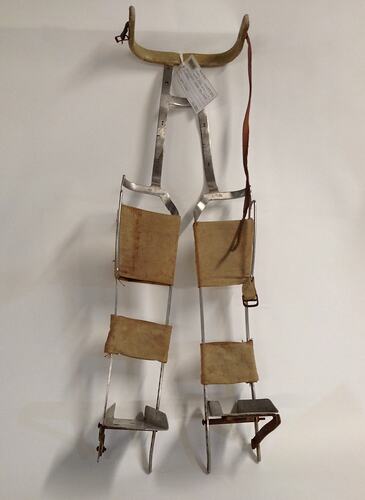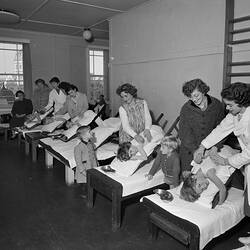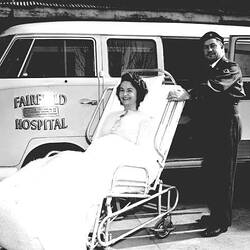Summary
Double leg splints made after 1904 and used at Fairfield Infectious Diseases Hospital.
The hospital was established in 1904 as a fever hospital. It treated Victorian patients for typhoid, diphtheria, cholera, small pox and the epidemics of polio and scarlet fever. It later became one of the world's foremost centres for the research and treatment of infectious diseases, especially HIV/AIDS. It was closed in 1996 amid controversy and protest.
Expertise in research and public health gained it international recognition. Dedication and perfecting of skills led to what became widely known as the "Fairfield culture of care" which involved medical, nursing, allied health and pastoral care. It also established the Macfarlane Burnett Institute. The combination of it's multidisciplinary approach along with active research led to international renown.
Significance
Fairfield Infectious Diseases Hospital began life in 1904 as a fever hospital. It treated Victorian patients for typhoid, diphtheria, cholera, small pox and the epidemics of polio and scarlet fever. It late became one of the world's foremost centres for the research and treatment of infectious diseases, especially HIV/AIDS. It was closed in 1996 amid controversy and protest.
Expertise in research and public health gained it international recognition. Dedication and perfecting of skills led to what became widely known as the "Fairfield culture of care" which involved medical, nursing, allied health and pastoral care. It also established the Macfarlane Burnett Institute. The combination of it's multidisciplinary approach along with active research led to international renown.
The objects cover the entire period of the hospital's history and represent the areas of nursing, medicine, administration, pharmaceuticals, occupational therapy, infectious disease care and control, disability and mobility aids. Highlights of the collection are:
" Shredder: used to shred hay for making mattresses. Each mattress was burnt after it was used by a patient with infectious disease
" Pedal-powered French jigsaw: used by patients with polio as a form of occupational therapy; carpentry work was conducted whilst strengthening the legs
" Doll collection: approximately 25 dolls and their accessories made by nurses as part of their training at Fairfield; each doll represents one of the nurse archetypes; these are accompanied by an illustration outlining the archetypes eg sister of charity, Benedictine monk, Florence Nightingale, priestess, ambulance nurse
" Polio disability aids: callipers and splints for toddlers, children and adults
" Pneumonia jackets: used for babies with pneumonia
" Fumigation bags: used for the fumigation and sterilisation of materials that were in contact with infectious agents
" Blood pump for direct blood transfusion
" Nursing uniforms: cover period 1910-1980
More Information
-
Collection Names
-
Collecting Areas
-
Acquisition Information
Donation from Fairfield Hospital Archives, Heidelberg Repatriation Hospital, Barbara Rossal-Wynne - Heidelberg Repatriation Hospital, Nov 2008
-
Place Used
-
Classification
-
Category
-
Discipline
-
Type of item
-
References
Anderson, WK, 2002, Fever Hospital: A History of Fairfield Infectious Diseases Hospital, Melbourne University Press
-
Keywords


